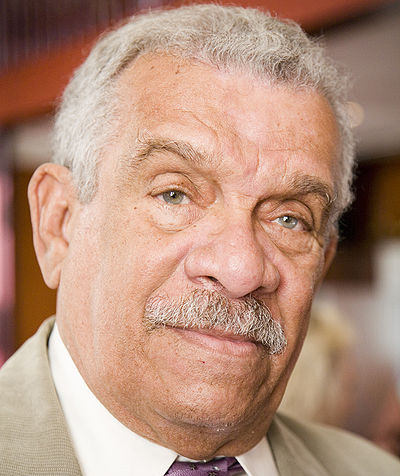Minnesota’s climate is about as far as you can get from the Caribbean’s. However, on Sept. 20, Gustavus’s windy campus will welcome a Caribbean native and Nobel Prize-winning author, Derek Walcott. Walcott will participate in a three week residency program at the school, with the intention of connecting students to a person of great stature in the academic world.
Gustavus’s Rydell Distinguised Professor program was established in 1995 by Drs. Susan and the late Robert Rydell of Minnetonka, Minn. The program brings annually a distinguished scholar, often a Nobel laureate or Nobel conference presenter, to the Gustavus campus for an extended and personal visit. The guests usually give a public lecture but also visit personally with many Gustavus students through team-teaching classes and receptions with student groups.
Tom LoFaro, professor of mathematics, has been the director of the Rydell program at Gustavus since 2005. He explains that, due to the request of the donors, the visiting professors are typically involved in science. LoFaro mentioned that this was the first non-scientist to participate since he began directing the program.
He became interested in the program after hosting one of the Rydell scholars, a mathematician, in 2003. He usually meets potential candidates at Nobel Conference receptions, which gives the scholars a chance to see what Gustavus is about. “[It] provides a great experience for speakers, and they are often willing to come back after experiencing the excitement and hospitality here,” LoFaro said.
Derek Walcott was born in St. Lucia, an island in the Caribbean, in 1930. He is first and foremost a poet but has also gained recognition for his plays, prose and painting. He was awarded the Nobel Prize for Literature in 1992 and is currently partaking in a three-year scholar in residence program at the University of Alberta.
Walcott was scheduled to be a speaker at the Nobel Conference last year, but his appearance was cancelled due to illness. The English department is thrilled to have him come this year. Professor of English Elizabeth Baer said, “It’s a huge honor for us to have a Nobel Prize literature winner on our campus.”
Baer is hosting a reception for the poet at her house and also will have him as a guest in her postcolonial literature class. Walcott will be bringing a new perspective to this class, she said, since he was born in the Caribbean, which is an area heavily affected by colonialism. He has dealt in real life with a lot of the themes her class is discussing figuratively.
Walcott will also be making appearances in Joyce Sutphen’s modern poetry class and having receptions with the classics department, the Diversity Center and the Firethorne editors. In addition, he will travel to Minneapolis for a possible interview with Minnesota Public Radio and a dinner, reception and reading.
Phil Bryant, professor of English at Gustavus, is playing a large part in organizing Walcott’s visit. He has met Walcott twice before: first when he was a graduate student at Columbia and later at a writing conference in Chicago. “[Walcott is] one of the significant poets of the latter half of the 21st century. What he represents is a widening and deepening of English poetry,” Bryant said.
So why should students who are not involved in the English program at Gustavus be interested in Walcott’s visit? Bryant mentioned Walcott’s connection to history—he has firsthand experience with colonialism, imperialism and historical racism. He also stressed that Rydell scholars often use their public appearance as an opportunity to connect their work to the general public.
Bryant remembered the speech of a former Rydell scholar, Sylvester James Gates. Gates is a prominent scientist in the study of superstring theory, and Bryant said that as an English scholar he still could connect to the speaker’s piece focused on an advanced physics theory.
So, whether you are an English or biology major, you can expect to enjoy Walcott’s public speech in Bjorling Hall at 8:00 p.m. on Sept. 27. Perhaps you will even see Walcott around campus or in one of your classrooms.
